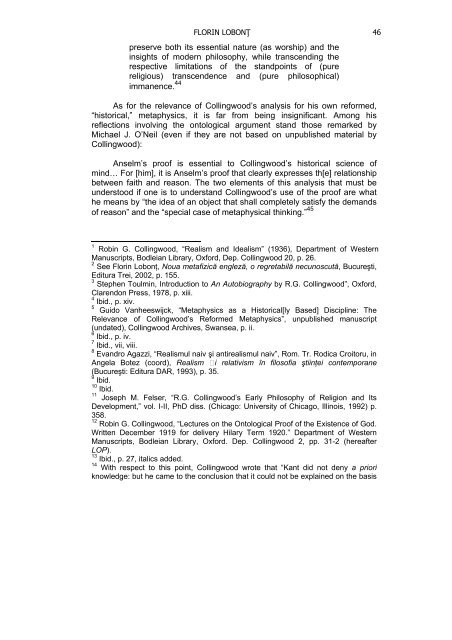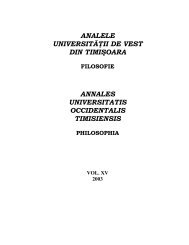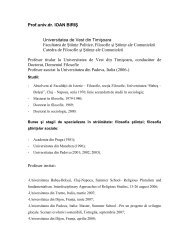VOL. IV (XXI) 2009 - Departamentul de Filosofie si Stiinte ale ...
VOL. IV (XXI) 2009 - Departamentul de Filosofie si Stiinte ale ...
VOL. IV (XXI) 2009 - Departamentul de Filosofie si Stiinte ale ...
You also want an ePaper? Increase the reach of your titles
YUMPU automatically turns print PDFs into web optimized ePapers that Google loves.
FLORIN LOBONŢ 46<br />
preserve both its essential nature (as worship) and the<br />
in<strong>si</strong>ghts of mo<strong>de</strong>rn philosophy, while transcending the<br />
respective limitations of the standpoints of (pure<br />
religious) transcen<strong>de</strong>nce and (pure philosophical)<br />
immanence. 44<br />
As for the relevance of Collingwood’s analy<strong>si</strong>s for his own reformed,<br />
“historical,” metaphy<strong>si</strong>cs, it is far from being in<strong>si</strong>gnificant. Among his<br />
reflections involving the ontological argument stand those remarked by<br />
Michael J. O’Neil (even if they are not based on unpublished material by<br />
Collingwood):<br />
Anselm’s proof is essential to Collingwood’s historical science of<br />
mind… For [him], it is Anselm’s proof that clearly expresses th[e] relationship<br />
between faith and reason. The two elements of this analy<strong>si</strong>s that must be<br />
un<strong>de</strong>rstood if one is to un<strong>de</strong>rstand Collingwood’s use of the proof are what<br />
he means by “the i<strong>de</strong>a of an object that shall completely satisfy the <strong>de</strong>mands<br />
of reason” and the “special case of metaphy<strong>si</strong>cal thinking.” 45<br />
1 Robin G. Collingwood, “Realism and I<strong>de</strong>alism” (1936), Department of Western<br />
Manuscripts, Bodleian Library, Oxford, Dep. Collingwood 20, p. 26.<br />
2 See Florin Lobonţ, Noua metafizică engleză, o regretabilă necunoscută, Bucureşti,<br />
Editura Trei, 2002, p. 155.<br />
3 Stephen Toulmin, Introduction to An Autobiography by R.G. Collingwood”, Oxford,<br />
Clarendon Press, 1978, p. xiii.<br />
4 Ibid., p. xiv.<br />
5 Guido Vanheeswijck, “Metaphy<strong>si</strong>cs as a Historical[ly Based] Discipline: The<br />
Relevance of Collingwood’s Reformed Metaphy<strong>si</strong>cs”, unpublished manuscript<br />
(undated), Collingwood Archives, Swansea, p. ii.<br />
6 Ibid., p. iv.<br />
7 Ibid., vii, viii.<br />
8 Evandro Agazzi, “Realismul naiv şi antirealismul naiv”, Rom. Tr. Rodica Croitoru, in<br />
Angela Botez (coord), Realism i relativism în filosofia ştiinţei contemporane<br />
(Bucureşti: Editura DAR, 1993), p. 35.<br />
9 Ibid.<br />
10 Ibid.<br />
11 Joseph M. Felser, “R.G. Collingwood’s Early Philosophy of Religion and Its<br />
Development,” vol. I-II, PhD diss. (Chicago: Univer<strong>si</strong>ty of Chicago, Illinois, 1992) p.<br />
358.<br />
12 Robin G. Collingwood, “Lectures on the Ontological Proof of the Existence of God.<br />
Written December 1919 for <strong>de</strong>livery Hilary Term 1920.” Department of Western<br />
Manuscripts, Bodleian Library, Oxford. Dep. Collingwood 2, pp. 31-2 (hereafter<br />
LOP).<br />
13 Ibid., p. 27, italics ad<strong>de</strong>d.<br />
14 With respect to this point, Collingwood wrote that “Kant did not <strong>de</strong>ny a priori<br />
knowledge: but he came to the conclu<strong>si</strong>on that it could not be explained on the ba<strong>si</strong>s




